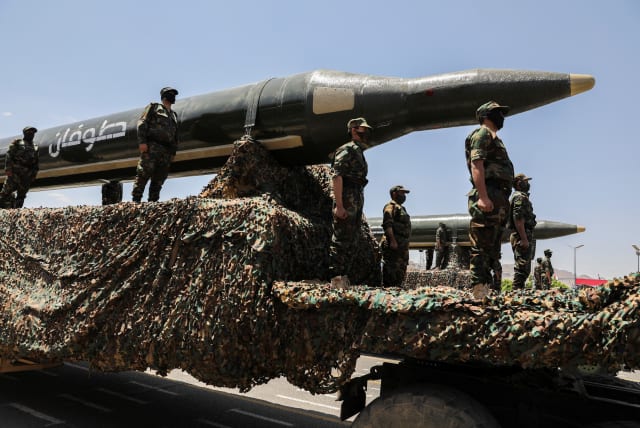Iranian-backed Houthi attack on Bahrain soldiers escalates Yemen tensions - analysis

Attacking members of the Bahrain military may have been purposeful by the Houthis.
An attack by the Iranian-backed Houthis that killed two Bahrain service members on the Yemen-Saudi border could lead to escalation in the Gulf. The Saudis expressed condolences to Bahrain this week in the wake of the attack. The US has also condemned the incident. The attack comes after the Houthis also had a large military parade on September 21 in Sana’a. This shows that the Iran-backed Houthis are prepared to use force again in Yemen.
“This terrorist attack was carried out by the Houthis, who sent aircraft targeting the position of the Bahraini guards on the southern border of the kingdom of Saudi Arabia despite the halt of military operations between the warring sides in Yemen,” the Bahraini military statement said.
On Monday, the official spokesman for the Arab Coalition to Support Legitimacy in Yemen, Brigadier General Turki Al-Maliki, announced the martyrdom of an officer and a non-commissioned officer and the wounding of a number of members of the duty force participating from the Kingdom of Bahrain who were on the border of Saudi Arabia and Yemen.
In a phone call made by Saudi Crown Prince Mohammed bin Salman to Bahraini King Hamad bin Isa Al Khalifa, he expressed his condolences for the martyrs of the Duty Force members, Al-Ain media reported. Riyadh sees this as a “treacherous blow to peace.” The attack is seen in the Gulf as evidence that the Houthis have not ceased their “provocative actions” and is not “consistent with the positive efforts being made to seek to end the crisis and reach a comprehensive political solution,” Al-Ain media said.
Reduced violence after a decade of war
What this means is that the Houthis appear to be prepared to continue targeted attacks that may harm stability on the borders of Yemen. There had been a reduction in violence in Yemen after a decade of war there. The reduced conflict came in part due to the shifts in Saudi-Iran ties after Iran and Saudi Arabia reconciled earlier this year. This also enabled the UN to help prevent an oil spill in the Red Sea.
Now, the recent attacks show the Houthis may be preparing a new round of escalations. This would be in line with Iran’s attempts to escalate in other areas in the region, such as using Shi’ite militias in Iraq, threatening US forces in Syria, and encouraging Hamas and Hezbollah to threaten Israel or stir up trouble in the West Bank. It could also be connected to destabilization on the border with Jordan where Iranian-backed groups are allegedly behind drug smuggling.
A massive Houthi military parade on September 21 also raised eyebrows in the region. The Houthis showcase missiles, drones, small attack boats, and even a warplane. The group appears to be showing that it has the military material to take over Yemen.Attacking members of the Bahrain military may have been purposeful by the Houthis. They may be trying to send a message to Bahrain and Saudi Arabia. Iran often likes to use a carrot-and-stick approach in the region, sometimes ratcheting up attacks and sometimes using diplomacy. As such Iranian-backed groups act as a kind of contract mafia for Iran, ready to use weapons to carry out “hits” for Tehran if need be. This is how Iran uses militias in Iraq, Syria, and Lebanon and has used the Houthis in Yemen in the past.
Jerusalem Post Store
`; document.getElementById("linkPremium").innerHTML = cont; var divWithLink = document.getElementById("premium-link"); if (divWithLink !== null && divWithLink !== 'undefined') { divWithLink.style.border = "solid 1px #cb0f3e"; divWithLink.style.textAlign = "center"; divWithLink.style.marginBottom = "15px"; divWithLink.style.marginTop = "15px"; divWithLink.style.width = "100%"; divWithLink.style.backgroundColor = "#122952"; divWithLink.style.color = "#ffffff"; divWithLink.style.lineHeight = "1.5"; } } (function (v, i) { });

